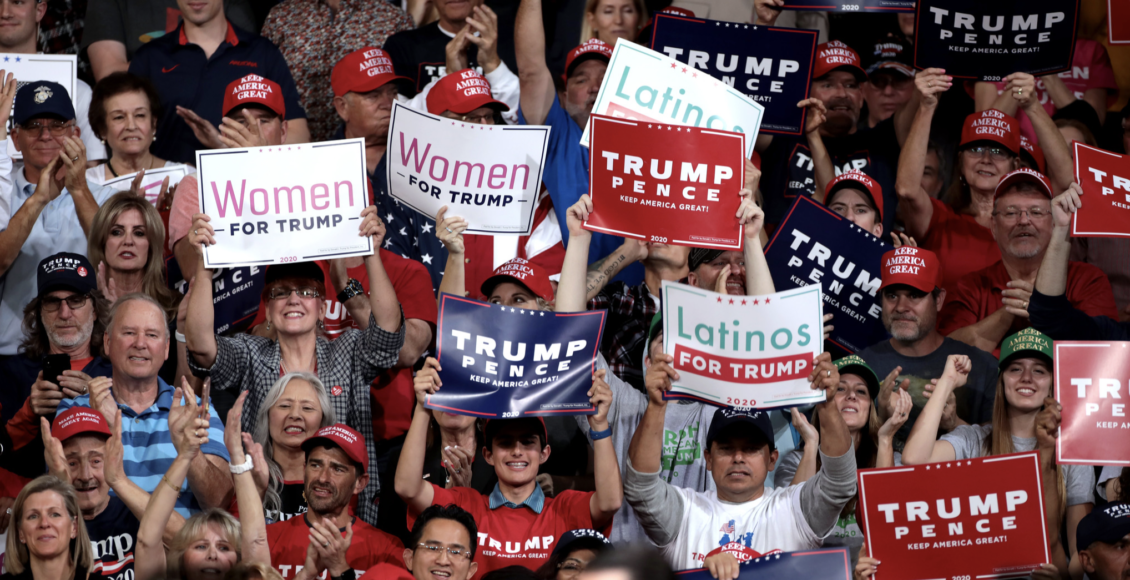Trump seeks the Latino Vote at Univision Town Hall

Latino Americans are more significant in this election than ever before, accounting for around 15% of eligible voters, with important concentrations in swing states such as Arizona and Nevada. Recent media coverage has focused on Vice President Kamala Harris’ struggles and Trump’s potential gains with Latino voters. At a recent town hall with Univision, the US’s largest Spanish-language broadcaster, Trump made his case to the Latino demographic.
Much of Trump’s pitch seemed to rely on his perceived skill in leading the American economy. During his introduction, Trump touted his economic record and ability to create jobs. However, when asked specifically how he would improve the economy, he provided very few details, and sometimes none at all. When a recent college graduate asked the former president how he might improve his job prospects, Trump told the young man that if he won, “you’re not gonna be looking at one job, you’re gonna be looking at a job you want,” without naming a single policy that would stimulate employment.
In response to a question about the national debt, Trump was equally vague, declaring that “what’s going to solve the problem is growth, it’s a thing called growth,” adding that Elon Musk’s appointment as leader of a government efficiency commission would reduce waste. When asked how he would bring down the cost of living, Trump committed to expand oil production and stop funding renewable energy initiatives, which he argues will bring down energy costs and reduce inflation. However, Trump is unlikely to be able to significantly hike oil production, which has reached record highs under the Biden administration. Interestingly, Trump made no mention of one of his key proposals, his plan to levy a 60 per cent tariff on all imports from China and a 20 per cent tariff on imports from all other countries. It’s possible that this omission was a calculated move, given that many Latinos have strong familial ties to other countries.
However, if intentional, this was a rare moment of political tact from Trump at this event. Many analysts, such as the New York Times’s Ezra Klein, have noted Donald Trump’s strong lack of inhibition, which reflects an instinct for brashness and a reluctance to tailor his statements to a particular audience.
Trump’s fortitude was tested at the Univision town hall, where attendees asked him a host of tough questions, including on his torpedoing of the border security bill; his false accusations that Haitian migrants are eating Americans’ pets; his conduct on January 6, 2021, when a pro-Trump riot stormed the US Capitol; and his denial of climate change.
Trump largely “weaved” away from the tougher questions and at times was seemingly tone-deaf: at one point, he told a man who had just asked him a question via an interpreter that migrants who can’t speak English are flooding into Springfield and are “looking all over for interpreters.” Similarly, when asked to explain his gun policy to the parents of school shootings victims, Trump replied that people need guns for “entertainment and for sport” as well as for “protection” without addressing school shootings. When a former Republican from New Jersey expressed dissatisfaction with Trump’s conduct on January 6, 2021, Trump responded by saying that there was “nothing done wrong at all” on that day, calling it a “day of love”.
Trump made clear his support for legal immigration but strong opposition to illegal immigration; his rhetoric on the subject wasn’t significantly different than usual. He falsely claimed that Black and Hispanic Americans were losing the most jobs to new migrants and that many migrants had come from “jails and mental institutions.” While he has accused Harris of being a Marxist in the past, Trump didn’t bring up these accusations during the event. Anti-communist sentiment animates an important portion of his Latino supporters, particularly those who have fled socialist countries such as Cuba and Venezuela.
At the Univision event, Trump relied on the image he has worked to build for himself, advertising his supposed business acumen and skill as a manager of the economy, despite offering very few concrete economic proposals. In a statement to USA Today, Jaime Flores, director of Hispanic outreach for the Republican National Committee, emphasized that Latino voters are American first and foremost, and said that the GOP is using “the same message” for Latinos as for all Americans: focusing on the economy and immigration. There’s evidence that this strategy might be effective: an October 13 New York Times/Siena poll found that 43 per cent of Latino voters support building a wall on the US-Mexico border and that their most widely chosen top issue is the economy. Overall, Trump’s support among Latinos seems to hover around 40 per cent, a record high for a Republican this decade.
However, a week after the Univision event, a comedian at Trump’s rally at Madison Square Garden called Puerto Rico “a floating island of garbage,” triggering widespread condemnation from Latino organizations, artists like Bad Bunny, and even fellow Republicans. While Trump has shown a remarkable imperviousness to controversy, the force of this backlash suggests that his lack of tact with Latinos may catch up to him.
Featured image: “Donald Trump supporters” by Gage Skidmore is licensed under CC BY-SA 2.0.
Edited by Idan Miller
